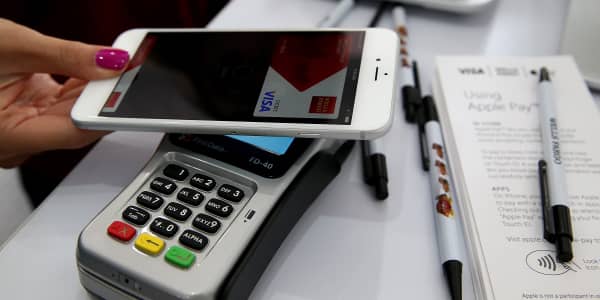The virtual spending boom
The move toward a cashless society won't occur in one fell swoop. And there won't be one single factor that brings it about.
There are, however, plenty of alternate payment methods that are nipping at its heels. Some have been around for more than half a century. Others have begun to pop up in the past few years. And a few are just getting their start now. But all of them shift the paradigm a bit.
Here are a few of the most popular cash alternatives, as well as some of the biggest up-and-comers.
—By Chris Morris
Posted 6 November 2014
Credit cards
No surprise here. Since the introduction of the Diners Club card in 1950, the credit card has allowed people to quit worrying whether they had enough cash on hand to buy something when the mood struck them. While early charge cards had to be paid off in full, the introduction of the BankAmericard in 1958 ushered in the cards we know today. Last year, Americans spent $4.077 trillion with their credit cards—a 7.9 percent increase from 2012.
Bitcoin
With its massive fluctuations in value and cyberpunk origins, Bitcoin has spurred more debate than most cash alternatives.There have also been financial scandals, such as the sudden collapse in April of Mt.Gox, which claimed to handle around 80 percent of all global dollar trades for bitcoin. There's still plenty of interest, though. Late last year the daily value of bitcoin transactions hit $257 million, surpassing Western Union. Overstock.com, meanwhile, says bitcoin transactions will add 4 cents per share to its earnings this year.
Apple Pay
Payments through Near Field Communication(NFC) devices have been forecast for quite some time, but given the wide footprint of the iPhone, Apple's entry into the market could be a significant step in broadening the cash alternative. Simply by tapping your phone (and starting in 2015, your Apple Watch) to a pad at the checkout lane and confirming the purchase with your fingerprint, it makes buying easier than ever at retailers like Macy's, Walgreens, McDonald's and the Apple Store.
While analysts haven't put forth any hard estimates about its impact, Piper Jaffray's Gene Munster says, "The reality is, this is the biggest news Apple's had in terms of consumer services since they launched iTunes. So I really think that the significance of this is going to sink in over the next six months."
Debit cards
While they're often (and easily) confused with credit cards, debit cards didn't make their debut until 1966—and didn't really become widely used until the 1990s. (In 1990, debit cards were used in just shy of 300 million transactions. Twenty years later that number was closing in on 37.6 billion transactions.)
Visa debit cards, in fact, are the most popular payment method of American consumers, according to the Nielsen Report. Last year they generated $1.079 trillion in spending at merchants last year, a 9.9 percent increase over 2012. MasterCard debit card purchases came in at $491.07 billion—a 9.5 percent increase.
Meanwhile, according to a 2013 Federal Reserve Payments Study, the number of debit card payments increased more than any other payment type from 2009 through 2012.
PayWave/PayPass
Apple Pay might be getting the most attention, but Visa and MasterCard both have their own contactless payment programs. PayWave (Visa) and PayPass (Mastercard) let cardholders simply tap their card, a specialized fob or (in some cases) a smartphone on a payment pad to instantly pay the amount owed—and guard against fraud, as the cashier never handles your card or sees the number.
PayPal/Alipay
Soon to be spun off from its parent company eBay, PayPal has long been a go-to method for people to pay online, especially in person-to-person transactions. The service has 152 million active registered accounts, and last year it processed $27 billion in mobile payments, essentially doubling the 2012 totals. Those are impressive numbers, but they pale compared to competitor Alipay, a division of Alibaba that says it processed $150 million in mobile payments last year.
QuickTap/Softcard
When you think about the alternate payment field, Coke probably isn't the first thing that comes to mind. Coca-Cola Amatil, a bottling operation in the Asia-Pacific region, has branched out, though. QuickTap is a cashless prepaid system focused on vending machines, letting people grab a drink even when they don't have a couple of singles on them. Just tap the card or your phone to the machine's touchpad and you can quickly quench your thirst. In North America, Coke launched a pilot program with Isis Payment (which has since been renamed Softcard), outfitting 200 vending machines in Austin, Texas, with small screens and contactless readers.
Facebook already plays a big part in many people's day-to-day lives—but now it's looking to get into their wallet. The social media site is reportedly working on a peer-to-peer payment service along the lines of PayPal. That would make it as easy to send money to a friend or family member as it is to share a picture with them.
Internet of Things
As devices get smarter, they could begin to make payments for you. LG already has a "smart refrigerator" on the market that tracks the food you've got and puts together a suggested shopping list for you. As the IOT progresses, experts say auto-reordering of food—whether from the local grocer or online services like Amazon—could become a fairly common practice in American homes.
Barter
Everything old is new again, even when it comes to purchasing. With people refreshing so many electronics and goods these days, many retailers have launched trade-in programs, letting people exchange their old phones or used video games for store credis. Amazon, for instance, lets users trade in everything from electronics to books to DVDs. Best Buy takes cell phones, computers and wearable technology. And GameStop has built a business on trade-ins of video games—and recently has started accepting smartphones and tablets as those have become go-to gaming devices.


